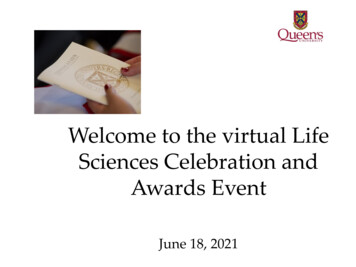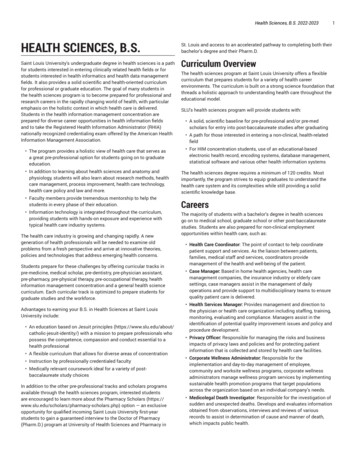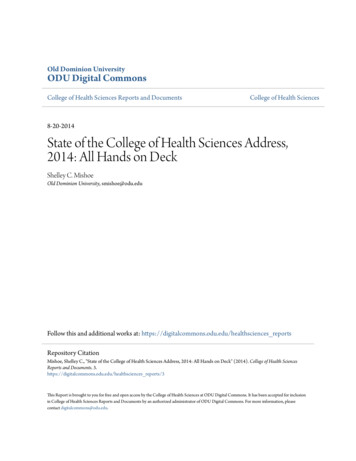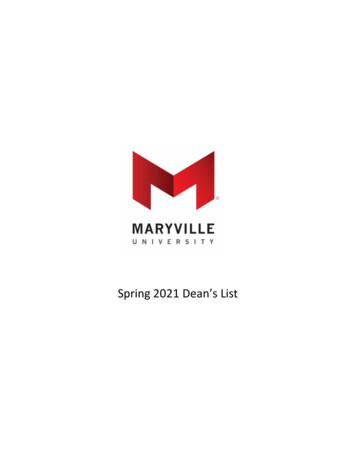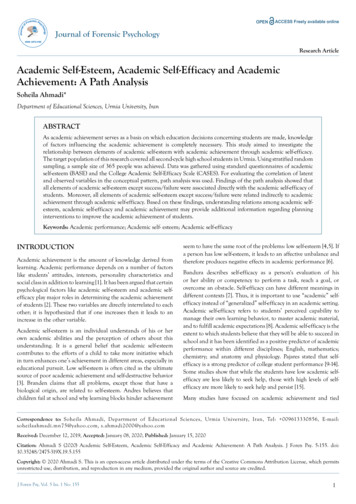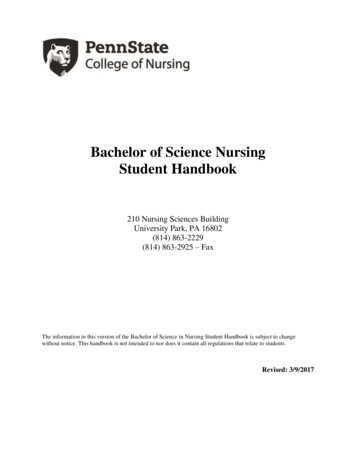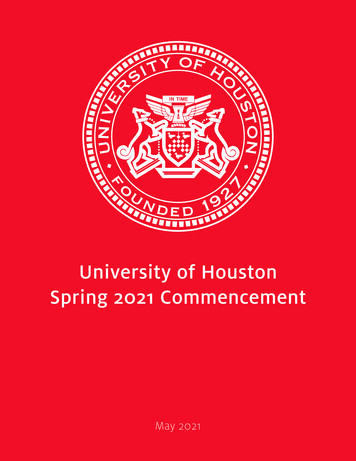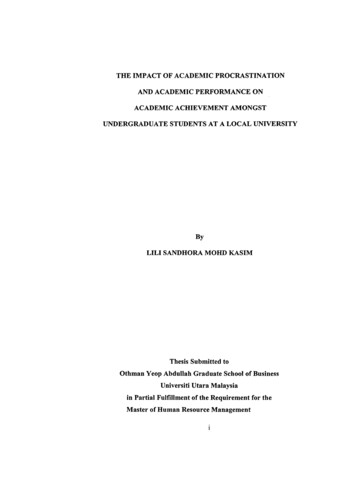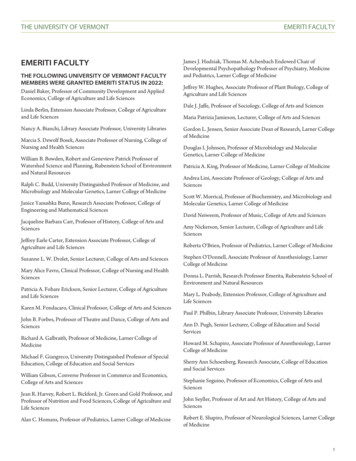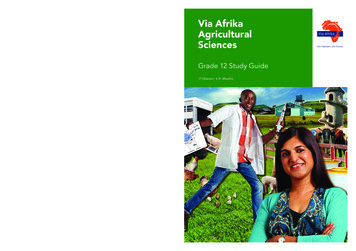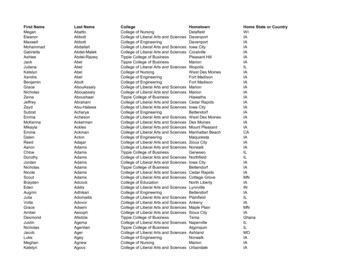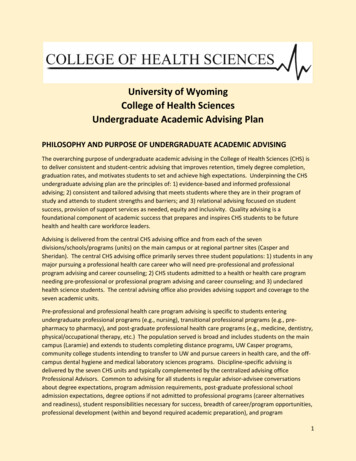
Transcription
University of WyomingCollege of Health SciencesUndergraduate Academic Advising PlanPHILOSOPHY AND PURPOSE OF UNDERGRADUATE ACADEMIC ADVISINGThe overarching purpose of undergraduate academic advising in the College of Health Sciences (CHS) isto deliver consistent and student-centric advising that improves retention, timely degree completion,graduation rates, and motivates students to set and achieve high expectations. Underpinning the CHSundergraduate advising plan are the principles of: 1) evidence-based and informed professionaladvising; 2) consistent and tailored advising that meets students where they are in their program ofstudy and attends to student strengths and barriers; and 3) relational advising focused on studentsuccess, provision of support services as needed, equity and inclusivity. Quality advising is afoundational component of academic success that prepares and inspires CHS students to be futurehealth and health care workforce leaders.Advising is delivered from the central CHS advising office and from each of the sevendivisions/schools/programs (units) on the main campus or at regional partner sites (Casper andSheridan). The central CHS advising office primarily serves three student populations: 1) students in anymajor pursuing a professional health care career who will need pre-professional and professionalprogram advising and career counseling; 2) CHS students admitted to a health or health care programneeding pre-professional or professional program advising and career counseling; and 3) undeclaredhealth science students. The central advising office also provides advising support and coverage to theseven academic units.Pre-professional and professional health care program advising is specific to students enteringundergraduate professional programs (e.g., nursing), transitional professional programs (e.g., prepharmacy to pharmacy), and post-graduate professional health care programs (e.g., medicine, dentistry,physical/occupational therapy, etc.) The population served is broad and includes students on the maincampus (Laramie) and extends to students completing distance programs, UW Casper programs,community college students intending to transfer to UW and pursue careers in health care, and the offcampus dental hygiene and medical laboratory sciences programs. Discipline-specific advising isdelivered by the seven CHS units and typically complemented by the centralized advising officeProfessional Advisors. Common to advising for all students is regular advisor-advisee conversationsabout degree expectations, program admission requirements, post-graduate professional schooladmission expectations, degree options if not admitted to professional programs (career alternativesand readiness), student responsibilities necessary for success, breadth of career/program opportunities,professional development (within and beyond required academic preparation), and program1
accreditation standards that students must achieve. Based on students professional career interests,advising within the CHS is tailored to insure that students are advised by disciplinary experts and areinformed of and acting on expectations and options to maximize success.Advising plans from each of the seven divisions/schools/programs provide program-specific informationthat supports the CHS plan (see Appendices A-I).GOALS AND OUTCOMESGoal 1: Embrace and promote a culture of student readiness and success that overcomes barriers.Outcomes: students are aware of and access advising and support services in a timely manner, arerealistic about timelines to graduation and academic barriers/deficiencies they need to address, and areengaged in establishing a strong student-advisor relationship.Metrics: students gain admissions to CHS programs and/or post-graduate professional programs;advisors provide specific and focused resources and referrals (e.g., financial aid, tutoring, counsellingcenter) to maximize student success.Goal 2: First-year and first-semester transfer student advising is consistent, available, and studentcentered.Outcomes: Students understand the path towards degree completion and timeline. First year studentscomplete the majority of USP requirements in their first year. Issues concerning transfer courses/creditsare resolved.Metrics: 50% USP completion rate by end of 1st year in applicable majors assessed via an annual auditof 10% of sophomore class. Successful admission to CHS programs and/or transfer to another programwith documented handoff.Goal 3: Training and certification of all CHS advisors to ensure consistent, accurate, and timely advising.Outcomes: All advisors meet University advisor training standards and expectations as described in unitplans. CHS centralized advising office is prepared and able to provide advising when unit advisors arenot available. Advisors have a working knowledge of UW, CHS, and unit advising policies, procedures,and available resources.Metrics: Advisor certification level and annual performance evaluation (advising component).Goal 4: Clear governance and accountability for the CHS advising system that includes training, peermentoring/-observation, and professional development.Outcome: All personnel involved in advising can articulate the CHS advising process, policies andprocedures within specific units, and connection to and support from ACES.2
Metric: Established CHS and unit advising policies/procedures are regularly reviewed and amended toalign with new/contemporary advising developments (e.g., technologies, policies) that maximize studentsuccess.Goal 5: Adopt and utilize advising technologies and communication systems that promote studentsuccess.Outcome: All advisors are trained and proficient in using the advising technologies and platformsadopted by UW.Metrics: System in place to allow students to schedule advising appointments. System facilitates regularadvising communications with students (e.g., advising appointment reminders, scholarship information,registration/add/drop deadlines, program expectations, early alert, etc.). Advisors are able to createand easily access notes from previous advising sessions/advisors and track hand-offs to otheradvisors/programs.Goal 6: Promote engaged academic and career planning that is a shared responsibility between studentand advisor(s).Outcomes: Students are able to consistently use and understand registration tools, including degreeaudits. Students are aware of expectations, both academic and non-academic, for the field they arepursuing. Students applying to professional programs know and understand admission requirementsand know options or have alternative plans if they are not admitted.Metrics: Student and advisor collaborate in developing a degree completion plan (e.g., 2 or 4 yeardegree completion maps). Clear and regular communication about professional program admissionrequirements and alternative plans developed for at-risk students.Goal 7: CHS Professional Advisors are engaged with ACES and exploratory study track working groups toassist with development, implementation, and appropriateness of exploratory studies tracks thatbenefit students interested in health or health care professions.Goal 8: Regular assessment of CHS advising system.Outcomes: Maximize advising quality control, consistency, availability and effectiveness.Metrics: Student retention, timely degree completion, graduation rates, and admission to professionalprograms.3
COLLEGE ADVISING MODELFirst year and First semester-transfer student advising will:1. Be shared between the CHS central advising office and units within the college. This is necessary dueto the number of first year and first semester-transfer students coming to the CHS, the nuances andprescriptive nature of multiple accredited professional and pre-professional programs in the college, andprograms at UW Casper (Medical Laboratory Sciences and Social Work) and Sheridan College (DentalHygiene).2. Be provided by experienced and trained Professional Advisors in the CHS central advising office andsome units. CHS units providing first year and first semester-transfer student advising will insure thatadvisors are trained and experienced.3. Include no less than one advising appointment in the first semester and may include secondaryadvising from Professional Advisors in the central CHS advising office or academic unit.4. Include pre-professional and professional career planning and advising from the central CHS advisingoffice for students pursuing careers in health care. The CHS Professional Program Advisors possessadditional expertise, e.g., interstate exchange programs and non-academic expectations that provideadditional value to students. While not all first year and first semester-transfer students will need thissecond layer of advising in their first semester/year, it will be available throughout the program of study.5. Insure that all advisors in the CHS system are trained to determine when a student, at any stage intheir program of study, needs or would benefit from a referral for pre-professional/professionalprogram advising from the central CHS office.Health Sciences undeclared first year and first semester-transfer students will be advised by the centralCHS office (Professional Advisors). A focus of this advising will be working with students and accessingother support resources to encourage career exploration that informs and leads to timely degreedeclaration matched to student aspirations. For the Dental Hygiene and Communication Disordersprograms, first year and first semester-transfer students will be advised by Professional Advisors in thecentral office or collaboratively with advisors in each of the units. Advising of Dental Hygiene studentswill include clear communication about prerequisite coursework and developing a competitive studentprofile for admission to the Sheridan program and other programs. Completion of prerequisitecoursework and student understanding of academic expectations to be competitive for graduate schooladmission in Speech-Language Pathology or Audiology will be central to advising for first year and firstsemester-transfer students in Communication Disorders.Professional Advisors advising first year and first semester-transfer students (not advised within aspecific unit) will insure a seamless handoff to a specific program advisor after the first semester or firstyear depending on student preparation and readiness to enter pre-professional or professionalprograms. These handoffs may be to other Professional Advisors or faculty advisors within any of theseven CHS units. For pre-professional health care students majoring outside of CHS, the central CHSadvising office will provide advising that complements that of the major advisor and will insure regularand open communication with the major advisor throughout a student’s program of study.4
Layered and consistent advising from both the major-/program-specific advisors and the central CHSadvising office creates a holistic and developmental advising process. It is the intent of the CHS advisingsystem to progress CHS students from a first semester/year advisor to discipline-specific advisors withineach program once the student is pre-professional or professional program ready, while continuing toprovide pre-professional and professional program advising. Within the CHS central advising office, allattempts will be made to keep students assigned to the same advisor so that relationship buildingoccurs.Across all CHS units, some faculty will have formal undergraduate advising responsibilities (creditawarded in job description). Faculty not formally assigned to advising will serve as professional mentorsto students. Faculty assigned to formal advising will complete requisite training that is commensuratewith the type and level of advising duties assigned. Faculty in some units may be engaged in first yearand first semester-transfer student advising; these faculty will be expected to obtain advanced training(higher certification level) than faculty not advising first-year or first-semester-transfer students. Detailsabout faculty participating in advising and student groups they advise are reported in Tables 1 and 2below and in Appendices B-I. The majority of faculty advisors will advise students after the student’sfirst semester (transfer) or first year. First year and first semester-transfer student advisors will providea handoff to faculty advisors and communicate the change in advisor to the student.Across the CHS, advising will be intentional and relational. It will extend beyond routine course selectionand be holistic. Elements of a holistic advising include:1. Degree completion mapping2. Review of progress3. Identification of barriers/struggles4. Development of remediation plans as needed5. Provision of support resources (e.g., financial aid, counseling center, tutoring)6. Identification and communication about value-added educational opportunities (e.g., study abroad,interprofessional education)7. Communication with other advisors within and outside of the CHS8. Guidance about non-academic professional preparation (e.g., extracurricular, civic, volunteerengagement)9. Well-being assessment within scope of expertise and referral to support resources if needed5
STAFFINGCollege of Health Sciences Advising Organizational Chart6
Table 1. First Year and First Semester-Transfer Student Advisors: College of Health alth ProfessionAnticipatedCommunicationDisordersDental HygeineKinesiology & HealthNursing - BasicNursing - CompletionPharmacySocial Work1Social Work - UWCCaseload (#)Craig VaskeTBDTBDCraig VaskeTBDTBDCraig VaskeTeresa GarciaMark GuibersonCraig VaskeJennifer MartinMark ByraDebra ShoefeltLeAnn Amen-McConnellMaria BennettValerie Thompson-EbanksKym CodallosJeremiah VolkCertification LevelsCurrent FGFGFGFNoneGF43/43/4443444444GF Grandfather policy anticipated or knownTable 2. Subsequent Year Student Advisors: College of Health laredHealth ProfessionAnticipatedCraig Vaske/Professional AdvisorCommunicationDisordersDental HygieneCraig Vaske/Professional AdvisorMary Jo Hidecker/FacultyErin Bush/FacultyBreanna Krueger/FacultyMary Hardin-Jones/FacultyRoger Steeve/FacultyDavid Jones/FacultyCraig Vaske/Professional AdvisorDawn Kiesel/Distance CoordinatorCaseload ion LevelsCurrent 1TargetGF4GF4GFGF0GFGFGFGFGF22222243/47
Kinesiology andHealthMed. LaboratorySciencesNursingBasic BSNNursingBSN CompletionNursingBRANDPharmacyJennifer Martin/Professional AdvisorMark Byra/FacultyMarci Smith/APLGretchen Sewczak-Claude/APLTucker Readdy/FacultyTristan Wallhead/FacultyJayne Jenkins/FacultyBoyi Dai/FacultyDerek Smith/FacultyJed Doxtater/Asst. Clin. Faculty,Program DirectorElizabeth Goodwin, Assist. LecturerMarilyn Hall, Assist. LecturerHolly Miller, Sen. LecturerKimberly Raska-Miller, Assoc. LecturerSherrie Rubio-Wallace, Assoc. LecturerTBD, Assistant LecturerLeAnn Amen-McConnell, Cred. Analyst& Academic AdvisorDavid Bodily, Assoc. LecturerWendy Wood Neeson, Endowed Chair(Sheridan College)Linda Williams, Assoc. LecturerDawn Carver, Cred. Analyst &Academic AdvisorRachel Thomas, Assoc. LecturerJoHanna Wedemeyer, Assoc. LecturerMaria Bennett/Professional AdvisorBrown, Travis, Faculty academicBruch, David, Faculty academicBushman, Jared, Faculty academicDolence, Kurt, Faculty academicHe, Guanglong, Faculty academicKrueger, Janelle, Faculty academicSingh, Reshmi, Faculty academicThyagarajan, Baskaran, FacultyVandiver, Jeremy, Faculty academicHornecker Jaimie, Faculty practiceMyran, Leena, Faculty practiceLinn, Becky, Faculty practiceBiehle, Lauren, Faculty practiceNguyen, Thanh Nga, Faculty practiceMahvan, Tracy, Faculty practiceMann, Allison, Faculty practiceZarbock, Sommer, Faculty practiceFox , Lanae - Faculty GF2242222222222222222228
Social Work1TBD, Assistant Lecturer (UW-Casper)Donna Bliss, Associate ProfessorTravis Labrum, Assistant ProfessorNeely Mahapatra, Associate ProfessorKirsten Havig, Assistant Professor1520151515NoneGFNoneGFGF22222GF Grandfather policy anticipated or knownProfessional Advisors in the CHS central advising office are cross-trained to provide advising coverageduring academic breaks. Additionally, advisors identified above with 12-month appointments (N 14)will assist with advising coverage during academic breaks.The CHS plans to develop two new college-level awards to recognize Outstanding Academic AdvisingAchievement. The college’s Faculty and Staff Development committee will develop criteria andnomination process for these awards during AY 2018-19. Unit advising plans also have mechanisms inplace to recognize advising performance.All CHS advisors (main and off-campus) will complete multi-level trainings and obtain certifications thatalign with advising responsibilities assigned/performed (e.g., faculty level 2 certification and professionaladvisors level 4). After first year training and certification, advisors will complete annual professionaldevelopment continuing education in advising. The CHS central advising office will coordinate anddeliver advising updates to unit advisors twice per AY at least three weeks prior to the start of advisingweek. Professional advisors will develop 2-year professional development plans and submit them to theCHS central advising office and their supervisor.STUDENT RESPONSIBLITIESIn the CHS, student responsibilities and expectations for advising are: schedule and attend at least one advising appointment per academic term understand progress to degree & prerequisites understand admissions expectations and requirements for intended field understand professional expectations of field open and honest communication with advisor prepare for advising appointments – questions, concerns, proposed schedules, pre-advisingworksheet (if applicable), barriers, thoughtful review and reflection of academic status and progress,opportunities to access, financial aid, personal well-beingResponsibilities and expectations related to advising will be regularly communicated in several ways: Published in student handbooks Presented and discussed at orientation sessions9
Available via College/unit websites Emphasized at the first advising appointment and reviewed at subsequent advising appointments With improved technology resources, responsibilities and expectations will accompany electroniccommunications to students reminding them about advising week/appointments and to come to theirappointment prepared.The CHS is committed to student-valued and strategic (targeted and not overwhelming) communicationwith students. With currently available technologies, we anticipate that communications will be largelydisseminated via e-mail and will include key items such as notification of advising times, early alert,add/drop deadlines, and advising preparation checklists.EVALUATION AND ASSESSMENT OF ACADEMIC ADVISINGSupported by forthcoming guidance from the advising advisory group, ACES, and UW administration, theCHS will develop an evidence-based strategy for evaluating and assessing academic advising to informcontinual improvement and quality control of advising. It is anticipated that this strategy will bedeveloped during the 2018-19 AY and will align with key metrics and processes from forthcomingguidance. In the interim, the CHS will use the following metrics to establish baselines against whichchanges resulting from our re-envisioned advising system can be compared. Student evaluations of advising effectiveness Professional and pre-professional program admission rates Student retention rates Student graduation rates Timely degree completion 50% completion of USP requirements at start of sophomore year Advisor evaluation (process to be determined)10
Appendix A – PreProfessional Health Sciences Advising PlanBackground: While significant numbers of students enter college with the goal of matriculating intograduate health degree programs such as medical, dental and physical therapy school, the prerequisitesfor these fields do not constitute majors at the UW. The College of Health Sciences Advising Centeroffers prehealth professions advising to all interested UW students, Wyoming Community Collegestudents intending to transfer to the UW, and UW alumni, regardless of major.1. Prehealth Professions Advising is supplemental advising in addition to advising by majordepartments. The Health Science Advising Center may also offer primary advising to prehealthprofessions students in two circumstances:a. Students with previous bachelor’s degrees returning to the UW to complete additional prerequisitecoursework and/or demonstrate current academic skills – exceptions being BRAND students (advised bySchool of Nursing) and students pursuing a Master of Science degree in Speech-Language Pathology(advised by Division of Communication Disorders).b. Newly admitted students (freshmen or transfer) who are unsure of what field they wish to earn theirdegree in, in order to reach their goal of matriculating in a health professions program.2. Prehealth advising assists students in:a. Identifying and navigating prerequisite coursework, in addition to major coursework.b. Understanding academic, professional and non-academic requirements and expectations to becomecompetitive candidates for graduate health professions.c. Realistically assessing competitiveness for graduate health professions programs and plotting outrealistic paths to reach goals.d. Considering alternative health and other professions when student determines initial goal is no longerappropriate.e. Navigating the admissions process including, but not limited to, standardized test preparation,interview preparation, essay writing, understanding admissions data, constructing application packages,soliciting letters of evaluating and evaluating multiple school and financial offers.f. Locating and obtaining shadowing, research, volunteer and other opportunities that may aid inexploration of possible health care careers and to become a more competitive candidate.3. Prehealth Professions Advising also serves as the liaison concerning the WICHE Professional StudentExchange, WWAMI Medical Education, Western Regional Graduate and WYDENT Dental EducationProgram and Wyoming residents considering these programs.4. PreProfessional Advising will:a. Conduct routine outreach to Wyoming Community Colleges to assist prehealth professions studentsin creating the necessary academic and experiential foundations to successfully navigate prehealthcurriculums at the university level.11
b. Work to identify UW, and potential UW, students interested in graduate health programs and offerthem services.5. Coordination of Prehealth Professions services such as essay review and interview preparation will beoffered to students pursuing programs on the UW campus including sophomore admit BSN, pharmacy,dental hygiene and MS in Speech Language Pathology.6. Prehealth professions advising will serve as the liasion between academic departments and graduatelevel health professional programs that routinely accept UW graduates concerning availability andappropriateness of courses to meet prerequisites.7. Prehealth Professions Advising will act as an advocate for prehealth students on campus, and withoutside entities including organizations representing graduate health professions program, enrichmentprograms, and potential work, volunteer and shadowing sites.8. Create, maintain and analyze data sets to better advise prehealth professions students and predictsuccess.Staffing: All advisors in the Health Sciences Advising Center will be fully qualified advisors and be able toadvise prehealth professions students. At least one individual in the center will also be qualified toconduct workshops for prehealth students. At least one individual in the center will be an activemember of the National and Western Associations of Advisors for the Health Professions.All prehealth professions advisors will routinely work with UW departments, advisors and distancecoordinators. The HS Advising Center will provide basic training in prehealth professions advising tointerested faculty and staff advisors (including at the community colleges if desired).12
Appendix B – Dental Hygiene Advising PlanBackground: The UW Dental Hygiene (DHYG) program is administered through a cooperative degreewith Northern Wyoming Community College’s (NWCC) DHYG program in Sheridan, WY. Students must:1. Complete prerequisites for the NWCC DHYG program,2. Apply and be competively admitted to NWCC DHYG.3. Complete the NWCC DHYG program.This program results in an Associates of Applied Science, which is the entry level degree for DHYG. TheUW enables students to complete additional upper division electives (typically 3 to 5 classes) to earntheir bachelor’s degree in DHYG. While most applicants to the NWCC/UW DHYG program will completetheir prerequisites elsewhere, a small number do so at the UW Laramie Campus. Therefore there aretwo populations for advising in the DHYG program:1. preDHYG students in Laramie completing prerequisites and applying to the DHYG programs.2. UW Distance students enrolled in the clinical DHYG program in Sheridan, on the NWCC campus.preDHYG students in Laramie:1. Advised by Health Sciences Advising Center.2. Advised towards preprofessional model of understanding competitiveness, researching and applyingto multiple schools and considering alternative careers and majors if applications to DHYG programs areunsuccessful.3. Students who do apply to the NWCC DHYG program will be guided towards completion of upperdivision requirements and all USP courses, except the C3, prior to admissions to NWCC DHYG in order toexpedite completion of the bachelors degree.4. Students who enter Associates level DHYG (e.g. LCCC – Cheyenne), or other allied health associatesdegrees, will be informed about their options for obtain bachelors degrees either in their professionalfields or via the UW BAS degree.DHYG students in Sheridan1. Advised by Northern Wyoming Community College Distance Coordinator. Currently Dawn Keisel. Ifthe NWCC Distance Coordinator is not available, the Health Science Advising Office will be available viaphone and email to provide advising.2. Since the Bachelors of DHYG is not required for students entering the profession, the NWCC DistanceCoordinator will work to clarify the benefits and requirements of earning the bachelors degree to allstudents admitted NWCC DHYG program.3. Students in NWCC DHYG program will be encouraged to take upper division electives in addition toDHYG courses, or over the summer semester, to expedite completion of the bachelors degree.13
Staffing: Laramie preDHYG and Sheridan DHYG AdvisorsProgramAdvisorCaseload (#)preDHYG LaramieDHYG Sheridan1HS Advising Office StaffDawn Kiesel1030Certification LevelCurrent 1TargetGF4GF3GF Grandfather policy anticipated or known14
Appendix C – Medical Laboratory Sciences Advising PlanBackground: The UW Medical Laboratory Science (MLSK) program is administered through acooperative degree with Casper College’s MLTK program in Casper, WY. Students must:1. Complete prerequisites for the UW MLSK program, located in Casper, Wyoming. Typically this willbe by obtaining the Associate of Science Medical Laboratory Technician from Casper College.2. Apply and be admitted to UW MLSK program.3. Complete the UW MLSK program.Since the MLSK program requires either a prior completed bachelors degree or an Associates of Sciencein Medical Laboratory Technician, which is not offered by the UW, there are no lower division UWstudents to be advised.The MLSK will program will maintain one faculty member, with an appointment at the UW, who willcomplete advisor training up to at least level 3. This individual will be responsible for advising all MLSKprogram students. If the primary advisor is not available, advising will be provided by the UW DistanceCoordinator located at Casper College.Students completing upper division electives (junior level coursework) will be advised as Health SciencesUndeclared by the Health Sciences Advising Office (if located in Laramie), or the appropriate DistanceCoordinator, if completing courses at a UW Outreach Center.Staffing: Medical Laboratory ScienceProgramAdvisorMed. LaboratorySciences1Jed Doxtater/Asst. Clin.Faculty, ProgramDirectorCaseload (#)25Certification LevelCurrent1TargetGF3/4GF Grandfather policy anticipated or known15
Appendix D – Communication Disorders Advising PlanPHILOSOPHY AND PURPOSE OF UNDERGRADUATE ACADEMIC ADVISINGThe goal of undergraduate advising for the BS in Speech, Language, and Hearing Sciences (SPPA) isto develop mentoring relationships with students that will help students attach to the Division andfaculty and identify the careers that they will pursue. Student retention, course sequencing, andtimely degree completion are all key to this endeavor. Underpinning the advising plan are theprinciples of: 1) evidence-based and informed professional advising; 2) consistent and tailoredadvising that takes into account a student’s strengths, interests, as well as any existent barriers; and3) relational advising focused on student success, provision of support services as needed, andequity and inclusivity. SPPA students generally track to advanced degrees in speech-languagepathology (MS) or Audiology (AuD); with occasional students pursing a clinical doctorate in speechlanguage pathology (SLP-D), or a research doctorate in Speech, Language, and Hearing Sciences.Many students also identify related allied
The overarching purpose of undergraduate academic advising in the College of Health Sciences (CHS) is to deliver consistent and student-centric advising that improves retention, timely degree completion, graduation rates, and motivates students to set and achieve high expectations. Underpinning the CHS
